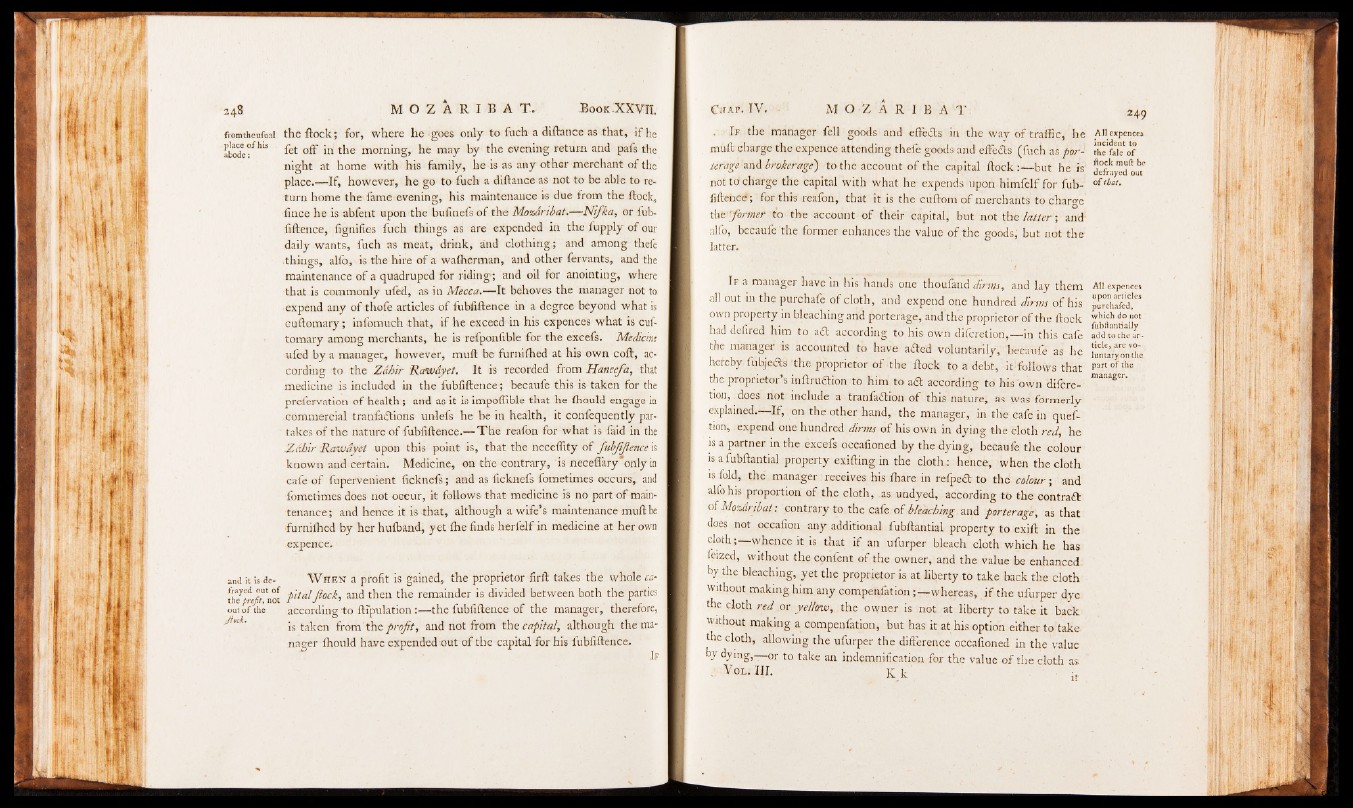
fromthcufu.il
place o f his
abode:
and it is defrayed
out of
the profit, not
out o f the
the flock; for, where he goes only to fuch a diftance as that, if he
fet off in the morning, he may by the evening return and pafs the
night at home with his family, he is as any other merchant of the
place.— If, however, he go to fuch a diflanGe as not to be able to return
home the fame evening, his maintenance is due from the flock,,
■ fince he is abfent upon the bufinefs of the Mozdribat.— Nifka, or fub-
fiftence, fignifies fuch things as are expended in the fupply of our
daily wants, fuch as meat, drink, and clothing; and among thefe
things, alfo, is the hire of a wafherman, and other fervants, and the
maintenance of a quadruped for riding-; and oil for anointing, where
that is commonly ufed, as in Mecca.— It behoves the manager not to
expend any of-thofe.articles-of fubfiftence in a degree beyond what is
cuftomary; infomuch that, if he exceed in his expences what is cuf-
tomary among merchants, he is refponfible for the excefs. Medicine
ufed by a manager, however, mufl be furnifhed at his own cofl, according
to the Zahir Rawdyet. It is recorded from Haneefa, that
medicine is included in the fubfiftence ; becaufe this is taken for the
prefervation of health; and as it is impoffible that he fhould engage in
commercial tranfadions unlefs he be in health, it confequently partakes
of the nature of fubfiftence.— T h e reafon for what is faid in the
.Zahir Rawdyet upon this point is, that the neceflity of fubjiflence is
known and certain. Medicine, on the contrary, 'is neceffary only in
cafe of fuper.venient ficknefs.; and as iicknefs fometimes occurs, and
fometimes does not occur, it follows that medicine is no part of maintenance;
and hence it is that, although a wife’ s maintenance mull be
furnifhed by her hufband, yet fhe finds herfelf in medicine at her own
expence.
W hen a profit is gained, the proprietor firft takes the whole capital
Jiock, and then the remainder is divided between both the parties
according to ftipulation:—the fubfiftence of the manager, therefore,
is taken from'the profit, and not from the capital, although the manager
fhould have expended out of the capital for his fubfiftence.
. If the manager fell goods and effeds in the way of traffic, he
mufl charge the expence attending thefe goods and effeds (fuch as porterage
zx\& brokerage) to the account of the capital fiock ;—but he is'
not to charge the capital with what he expends upon himfelf for fub-
fifleiicd; for this reafon, that it is the cuftom , , of merchants to chargOe
thf'farmer to the account of their capital, but not the latter; and
alfo, becaufe the former enhances the value of the goods; but not the
latter.
I f a manager have in his hands one thoufand d irm s . and lay them
all out in the purchafe of cloth, and expend one hundred d irm s of his
own property in bleaching and porterage, and the proprietor of the flock
had defired him to ad according to his own difcretion,— in this cafe
the manager is accounted to have ailed voluntarily, becaufe as he
hereby fubjeds the proprietor of the flock to a debt, iCfollows that
the pioprietors inflrudion to him to ad according to his'own difcretion,
. does not include a tranfadion of this nature, as was formerly
explained.— If, on the other hand, the manager, in the cafe in quef-
tion, .expend one hundred d irm s of his own in dying the cloth r e d , he
is a partner in the excefs occafioned by the dying, becaufe the colour
is a fubflantial property exifting in the cloth ; hence, when the cloth
is fold, the manager receives his fhare in refped to the c o l o u r ; and
alfo his proportion of the cloth, .as undyed, according to the contrad
of M e z d r ib a t : contrary to the cafe of b le a c h in g z a d p o r t e r a g e , as that
does not occafion any additional fubflantial property to exift in the
cloth;— whence it is that if an ufurper bleach cloth which he has
feized, without the confent of the owner, and the value be enhanced,
by the bleaching, yet the proprietor is at liberty to take back the cloth
without making him any compenfation;— whereas, if the ufurper dye
the cloth r e d or y e l la w , the owner is not at liberty to take it back
without making a compenfation, but has it at his option either to take
the cloth, allowing the ufurper the difference occafioned in the value
by dymg,— or to take an indemnification for the value of the cloth as
- V ol. III. K_k it
A ll expence»
incident to
the fale o f
(lock mull be
defrayed out
o f that*
All expences
upon articles
purchafed,
which do not
fubflantially
add to the a rticle,
are voluntary
on the
part o f the
manager.